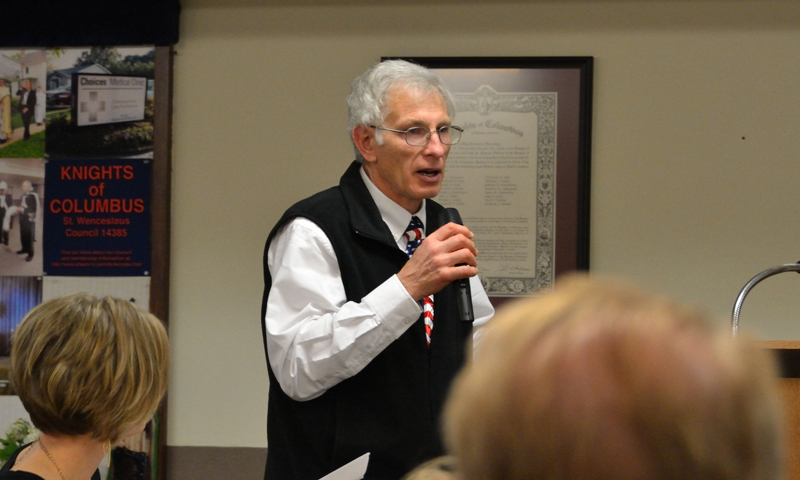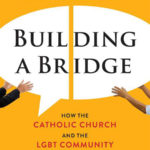By Lindsay Steele
The Catholic Messenger
IOWA CITY — About 90 people filled the basement hall of St. Wenceslaus Parish in Iowa City April 23 for a Culture of Life Dinner.
The annual event, now in its fourth year, serves as an opportunity to educate guests about natural fertility care and family planning methods and to raise scholarship money for persons interested in becoming Creighton Model FertilityCare practitioners. Practitioners can help educate couples and individuals on the symptom method of Natural Family Planning and make referrals to FertilityCare doctors in instances where irregularities are found.

David Fetzer, chairperson of St. Wenceslaus-Iowa City Knights of Columbus Natural Family Planning scholarship program, speaks at the Culture of Life Dinner at the parish April 23.
This year’s event featured Dr. Robert Pranger, a family practitioner from northeast Iowa. Because of his Catholic faith, he does not prescribe artificial forms of birth control to his patients. He spoke about the current status quo in reproductive medicine, which makes a push toward artificial means of birth control and infertility treatment. He identified how he uses Natural Family Planning methods to help individuals and couples not just with child spacing, but also with detection of infertility and other gynecological problems.
The Catholic Church does not approve of artificial forms of birth control for family planning, instead encouraging the faithful to use Natural Family Planning methods when child spacing is necessary.
Mary Anderson, an event organizer, said Dr. Pranger spoke in-depth about why most doctors are not familiar with Natural Family Planning and do not take it seriously in practice. Dr. Pranger believes pressure from pharmaceutical companies is a factor.
Individuals with personal Natural Family Planning experiences also spoke at the dinner. One woman explained how Natural Family Planning knowledge helped her to eliminate painful symptoms of endometriosis without having to rely on the commonly prescribed birth control pill.
Two individuals received scholarships at the dinner for Creighton Model FertilityCare training: Michael Schmidt, a member of St. Wenceslaus Parish and a Fourth Degree Knight of Columbus; and Elizabeth Wessling, a physician’s assistant from Sioux City, Iowa. The scholarship program is an initiative of the St. Wenceslaus Knights of Columbus. David Fetzer, scholarship coordinator, said scholarships range in value from $1,250 to $2,500, usually more if recipients are St. Wenceslaus parishioners.
Fetzer said people donated about $8,000 at and before the dinner to allow the Knights to continue offering these scholarships. Persons interested in learning more about the scholarship program can email dafetzer@gmail.com.
He was encouraged by the audience’s response to the speakers at the Culture of Life dinner. “In my opinion, this was the best of the four dinners,” he said. “We are definitely gaining traction with this FertilityCare movement. Young couples and mothers are concerned at how long-term chemical (contraceptive) use affects their bodies, their fertility and the environment. Some have seen the chart displaying the parallel between the increased use of contraceptives matching the increased rate of divorce and questioning the advertising: Does the pill really empower women? Others are searching this option out as they desire to be faithful to Christ and his bride, the church.”
Anderson, too, felt encouraged. “I was really excited afterward. I could hardly sleep that night!”











